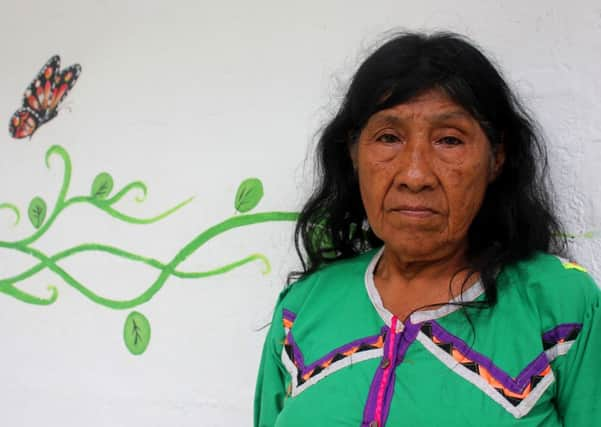Native Americans caught in Columbia’s drugs war


I sat with Rosa as she explained how non-indigenous people had first come to her area of Colombia, trading land for mirrors, guns and radios. A close relationship developed between the colonisers and the native American Emberá people. However, this ended when the Emberá refused to trade more land and their new-found friends became threatening and violent. The Emberá started their long retreat deeper into their forest. Now, in 2014, there is nowhere left for them to go.
The ongoing war in Colombia is as complex as it is long. The multifaceted conflict has involved deep rivalries between political parties, huge inequalities between the rich minority and poor majority, extreme violence between government forces, guerrilla groups such as FARC-EP and ELN, privately funded paramilitary groups, and of course, the cocaine trade.
Advertisement
Hide AdAdvertisement
Hide AdThe result is one of the longest-running wars in recent history, which has traumatised the country’s population and created a culture of violence in many parts. Untold numbers of people have died as a result of the armed conflict and targeted assassinations, and a staggering 5.3 million people have been displaced, having fled their homes or been thrown off their land.
It is within this maelstrom of violence that I recently spoke with Rosa Amelia Bailarin, an elderly Emberá woman living in northwest Colombia.
“When our leaders were killed we had to leave and we became displaced within our own land,” she told me. “We used to be spread out but when the violence increased we moved closer to each other.
“We used to go hunting, but we can’t do that anymore. We don’t know if there are minefields or others who will hurt us.”
The thirst for the country’s land and natural resources such as coal, gold and coltan, and the ambitions of legal and illegal armed groups to hold strategically important areas, have seen the Emberá and other vulnerable communities such as the Afro-Colombians and campesino peasant farmers intimidated, attacked and moved with no regard for their human rights.
The Emberá have sought to remain neutral in the conflict but this has had consequences, according to Norberto Guarabe, a schoolteacher in an Emberá settlement in Choco. He told me: “We have been victims of violence from all the different groups – the police, army, paramilitaries and the guerrillas. All the armed groups have taken from us. We’re in the middle of the conflict. The army says we are guerrillas and the guerrillas say we are aligned to the state. We have received death threats and our rights have been abused. We live in a chaotic situation because of the armed groups around us.”
The destruction of the forests and rivers is also having a huge impact on the communities, including on the preservation of their culture.
“Our forest was bombed a lot in this area,” Norberto added. “The indigenous people believe in Mother Earth. But with the conflict she has lost her spirit, so now we need help to get food. We are connected to the earth around us and we don’t have anywhere else to go. Our message to the people of Scotland is that we need humanitarian assistance.”
Advertisement
Hide AdAdvertisement
Hide AdSCIAF has been supporting projects in Colombia for many years and works with the Catholic dioceses of Apartadó and Quibdó to help many Emberá, Afro-Colombian and campesino communities. We have helped to provide seeds, tools, livestock and training to enable the Emberá to produce more food using their traditional farming methods so they can support themselves once again. SCIAF is also helping these communities to stand up for their rights, prevent the loss of their culture by documenting and recovering their traditions, and increasingly working with them so they can regain legal access to their land.
The plight of the Emberá people and other vulnerable groups in Colombia is the focus of SCIAF’s Wee Box, Big Change Lent campaign this year. In the campaign we ask people to commit to giving up something for the 40 days of Lent, put the money they save in a wee box and then donate it to us at Easter to help our work in Colombia and other countries. We are also asking supporters to look closer at their own lives and the decisions they make as consumers which can often have an impact on people in poorer countries.
The plight of the Emberá people is a desperate one. However, our actions can still help to make a difference.
• Mark Camburn is the Latin America Programme Officer for SCIAF (Scottish Catholic International Aid Fund): www.sciaf.org.uk
SEE ALSO